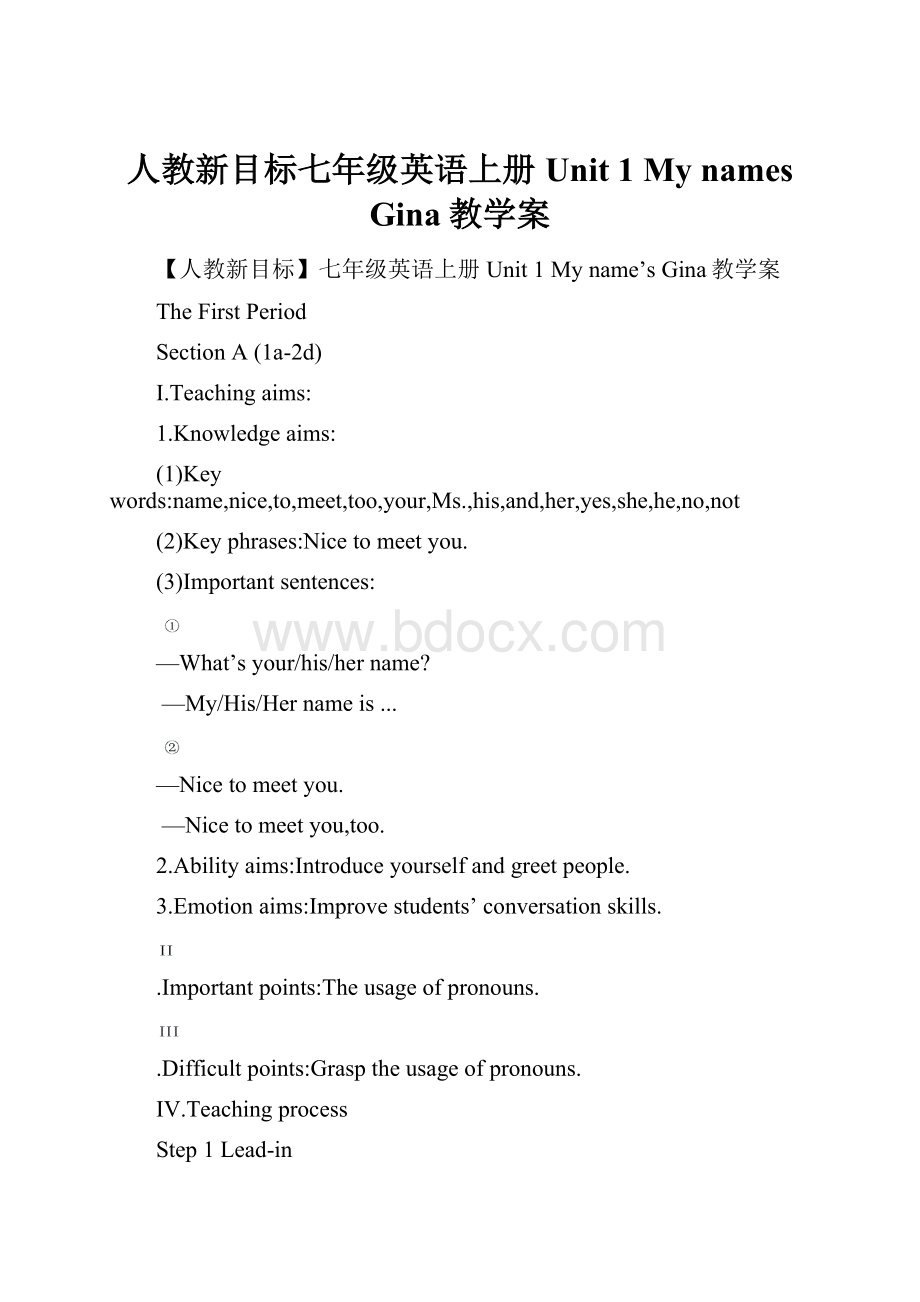人教新目标七年级英语上册Unit 1 My names Gina教学案.docx
《人教新目标七年级英语上册Unit 1 My names Gina教学案.docx》由会员分享,可在线阅读,更多相关《人教新目标七年级英语上册Unit 1 My names Gina教学案.docx(21页珍藏版)》请在冰豆网上搜索。

人教新目标七年级英语上册Unit1MynamesGina教学案
【人教新目标】七年级英语上册Unit1Myname’sGina教学案
TheFirstPeriod
SectionA(1a-2d)
Ⅰ.Teachingaims:
1.Knowledgeaims:
(1)Keywords:
name,nice,to,meet,too,your,Ms.,his,and,her,yes,she,he,no,not
(2)Keyphrases:
Nicetomeetyou.
(3)Importantsentences:
—What’syour/his/hername?
—My/His/Hernameis...
—Nicetomeetyou.
—Nicetomeetyou,too.
2.Abilityaims:
Introduceyourselfandgreetpeople.
3.Emotionaims:
Improvestudents’conversationskills.
.Importantpoints:
Theusageofpronouns.
.Difficultpoints:
Grasptheusageofpronouns.
IV.Teachingprocess
Step1Lead-in
Singalongwiththesong“ABCSong”.
Step2Revision
1.Showsomepicturesaboutthingsinyourroom.Suchaswindow,book,schoolbag,ruler,map,door,
cup,baseball...
2.Letstudentssaythemonebyone.
3.Workon1a.WriteEnglishwordsforthethingsinthepicture.
Step3Listening
Workon1b,2aand2b.
1.Playtherecordingforthefirsttime.Studentsonlylisten.
2.Playtherecordingagainandaskstudentstocomplete1b,2aand2b.
3.Checktheanswersin1b,2aand2b.
Step4Pairwork
Workon1cand2c.
1.Practicetheconversationsabovewithyourpartner.Thengreetyourclassmates.
2.Practicetheconversationsinpairsandrole-playthem.
A:
Hello!
What’syourname?
B:
Myname’s…/I’m…
A:
Nicetomeetyou!
B:
Nicetomeetyou,too!
A:
What’shisname?
B:
Hisname’s…
A:
Andwhat’shername?
B:
Hername’s…
Step5Role-play
Workon2d.
Pleaseletstudentsclosethebooksandlistentothetape.Answersomequestions.
1.Howmanypeoplearethereintheconversation?
2.Whoarethey?
Listenagainandtrytorepeatit.Afterthat,letstudentsrole-playtheconversationandgivethem4
minutestoreciteit.
1cMakeconversationsaboutthepeopleinthepicture.
Languagepoints
1.Myname’sGina.我的名字叫吉娜。
(教材第1页)
(1)这是一个作自我介绍的句型,也可以说:
I’mGina.。
(2)name’s是nameis的缩写。
【拓展】英美等国家的人在询问对方名字之前,习惯上先说自己的名字,表示自己愿意和对
方认识,这样显得有礼貌。
2.Nicetomeetyou!
很高兴见到你!
(教材第1页)
当两人初次见面或经别人介绍初次相识时,用该问候语。
回答时可用“Nicetomeetyou,too.”
too前要加逗号,还可以用“Gladtomeetyou!
”表示“见到你很高兴。
”
3.What’syourname?
你叫什么名字?
(教材第1页)
(1)what’s是whatis的缩写形式。
(2)该句为特殊疑问句,用于询问别人的姓名,答语有三种形式:
Myname’s+姓名;I’m+
姓名;直接回答姓名。
【辨析】your与you
your形容词性物主代词,意为“你的”,后接名词,不可单独使用;you为人称代词,既是
主格又是宾格,意为“你;你们”,后常接be动词are。
4.Ms.女士
用于女子的姓氏或姓名前,不指明婚否。
为了表示对对方的尊重,现代英语用Ms.称呼成年
女子。
如:
Ms.Wang王女士;Ms.Green格林女士。
【拓展】除此之外,英语中还用Mr.表示男士,用Mrs.表示已婚女士。
Exercise
1、用括号内所给单词的适当形式填空。
1.Hello!
________(I)nameisGina.
2.I________(be)Jenny.
3.Niceto________(meet)you!
4.What’s________(you)name?
5.—What________(be)that?
—It________(be)anorange.
2、单项选择。
1.—What’s_________name?
—MynameisJenny.
A.youB.IC.your
2._________Tony.
A.IB.IamC.My
3.Myname_________WeiHua.
A.amB.isC.are
4.—Nicetomeetyou!
—________,too.
A.I’mOKB.HowareyouC.Nicetomeetyou
Homework
1.Practice2dwithyourpartner.
2.Recite2d.
板书设计
Unit1Myname’sGina.
TheFirstPeriod
SectionA(1a-2d)
①—What’syour/his/hername?
—My/His/Hername’s...
②—Nicetomeetyou.
—Nicetomeetyou,too.
教学反思:
————————————————————————————————————————————————————————————————————————————————————————————————————————————————————————————————————————————————————————————
Unit1Myname’sGina.
TheSecondPeriod
SectionA(GrammarFocus-3c)
Ⅰ.Teachingaims:
1.Knowledgeaims:
(1)Keywords:
what’s=whatisname’s=nameisI’m=Iamhe’s=heisshe’s=sheis
(2)Importantsentences:
—What’shisname?
—He’s.../Hisname’s...
—AreyouHelen?
—Yes,Iam.
2.Abilityaims:
Improvestudents’spokenEnglish.
3.Emotionaims:
Motivatestudents’interestinknowingothers’names.
.Importantpoints:
Theusageofpronouns.
.Difficultpoints:
Grasptheusageofpronouns.
IV.Teachingprocess
Step1Revision
Chooseseveralstudentstorecite2d.
Step2Readandsay
WorkonGrammarFocus.
Askstudentstoreadthesentencesinthegrammarboxbythemselves.Payattentiontothechange
of“be”.Observethedifferencesbetweenpersonalpronounsandpossessivepronouns.
Focusontheshorteningwords.Trytoreadandrecitethem.(通过观察总结,让学生掌握be动词,
人称代词,物主代词的用法。
)
Step3Grammarexercise
Workon3aand3b.
1.Putthewordsinthecorrectordertomakeconversations.Thenpracticethem.
e.g.Sentence1:
yournamewhat’s
CindyI’m
→—What’syourname?
—I’mCindy.
Youcanfollowtheexample,finishSentence2andSentence3.
Thenpracticewithyourpartner.
2.Completetheconversationandpracticeitwithyourpartner.
Teachercheckstheanswerswithstudents.Choosetwostudentstoactitoutinfrontoftheclass.
Step4Groupwork
Workon3c.
Practiceintroducingyourselfandothersinagroup.
Let’shavealookathowmanynamesyoucanremember.
语法拓展
一、形容词性物主代词
概念:
形容词性物主代词是用来表示所有关系的代词。
1.具体用法,有人称和数的变化。
第一人称
第二人称
第三人称
单数
my
your
his/her/its
复数
our
your
their
2.用法:
(1)形容词性物主代词不能单独使用,后必须接名词,即在名词前作定语。
(2)形
容词性物主代词不能与冠词和指示代词连用。
(3)形容词性物主代词与形容词一起修饰名
词时,其顺序为:
形容词性物主代词+形容词+名词。
如:
myredpen我的红色钢笔
二、be动词的一般疑问句
1.概念:
一般疑问句是指可以用yes或no回答的疑问句。
本单元主要学习be动词的一般疑
问句。
2.结构:
be动词+主语+其他?
3.回答:
Yes,主语+be.(肯定回答)/No,主语+be+not.(否定回答)。
—IssheJenny?
她是詹妮吗?
—Yes,sheis./No,sheisn’t.是的,她是。
/不,她不是。
3、be动词可缩写与不缩写的情况
1.be动词的可缩写情况
(1)一般am,is,are与前面的名词或代词缩写时,省去前面的元音字母并在省去的地方加’。
如:
Iam→I’m;whatis→what’s;youare→you’re
(2)not与be动词的缩写形式。
如:
arenot→aren’t;isnot→isn’t
2.be动词不缩写的情况
thisis,amnot,those/theseare都没有缩写形式。
在一般疑问句的简略回答中,作肯定回答时,
代词不能与am,is,are缩写。
AreyouJim?
你是吉姆吗?
正:
Yes,Iam.误:
Yes,I’m.
Exercise
1、根据汉语意思完成句子。
1.他的名字叫杰克。
__________________isJack.
2.我叫吉姆,很高兴认识你!
_________Jim._________tomeet_________!
3.——她叫什么名字?
——詹妮。
—_________________name?
—_________Jenny.
4.——他是迈克吗?
——不,他不是。
—__________________Mike?
—No,_________________.
二、用括号中所给单词的适当形式填空。
1.Hello!
________(I)amMary.What’s_________(you)name?
2.—Howare________(you)?
—I’mfine,thank_________(your).
3.—What’s________(he)name?
—_________(he)nameisBob.
4.—Is________(she)Gina?
—No,_________(she)isn’t._________(she)name’sMary.
Homework
1.ReciteGrammarFocus.
2.Makenamecards.
板书设计
Unit1Myname’sGina.
TheSecondPeriod
SectionA(GrammarFocus-3c)
①—What’syour/his/hername?
—My/His/Hername’s...
②—Ishe...?
—Yes,heis./No,heisn’t.
教学反思:
————————————————————————————————————————————————————————————————————————————————————————————————————————————————————————————————————————————————————————————
Unit1Myname’sGina.
TheThirdPeriod
SectionB(1a-1f)
Ⅰ.Teachingaims:
1.Knowledgeaims:
(1)Keywords:
zero,one,two,three,four,five,six,seven,eight,nine,telephone,number,phone
(2)Keyphrases:
telephonenumber,phonenumber
(3)Importantsentences:
—What’syourtelephonenumber?
—It’s281-9716.
—Isthisyournumber?
—Yes,itis./No,itisn’t.
2.Abilityaims:
Learnsomenumbersfrom0to10.
3.Emotionaims:
Motivatestudents’interestinnumbers.
.Importantpoints:
Learntoreadandwritenumbers0—10.
.Difficultpoints:
Graspthepronunciationandspellingofnumbers.
IV.Teachingprocess
Step1Warmingup
Showsomeinterestingpicturesaboutnumbers.Letstudentslearnnumbers.
Step2Listening
1.Lookat1a,listenandrepeat.
2.Closeyoureyes,andmemorizefromzerotonine.
3.Now,pleaselookat1b.Listentotheconversationandwritethetelephonenumber.
4.Lookat1d.Listenandmatchthenameswiththetelephonenumbers.
5.Lookat1e.Listenagain.Completethephonenumbersin1d.
6.Checktheanswers.
Step3Pairwork
Workon1c.
Workinpairs.Askforandgiveyourphonenumbers.
A:
What’shis/hername?
B:
His/Hernameis...
A:
What’shis/hertelephonenumber?
B:
His/Hertelephonenumberis...
Askstudentstofillintheblanks.Checktheanswersandcorrectthemistakesifnecessary.
Step4Groupwork
Workon1f.
Gametime.Writeyourphonenumberonapieceofpaperandputitinabag.Thentakeoutapiece
ofpaperandfindtheanswer.You’llhave5minutestodothegame.Payattentiontosomerules.
(让学生们在游戏中体会学习的乐趣,轻松掌握数字。
)
Languagepoints
1.zero,one,two...nine0,1,2……9
以上这些词都是基数词。
基数词是用来表示“多少”的词,在书写时一般用阿拉伯数字,而
读的时候用英语。
其中0可以读作zero。
也可读作字母o的读音,当号码中有相同的两个数
字相连时,可以借助double(双的,两倍的)加数字来完成,也可逐个读出来。
2.What’syourtelephonenumber?
你的电话号码是多少?
(教材第4页)
(1)本句是用于询问电话号码的特殊疑问句。
回答时,可以说It’s...或Mytelephonenumber
is...或直接说出电话号码。
—What’syourtelephonenumber?
你的电话号码是多少?
—(It’s/Mytelephonenumberis)158xxxx195.我的电话号码158xxxx195。
(2)telephonen.电话
Thetelephoneisonthedesk.电话在书桌上。
(3)numbern.数;数字
SixandeightareluckynumbersinChina.在中国6和8是幸运数字。
【拓展】number还可译为“第……号”,常缩写为“No.”这时读音不变,而且缩写词后的“.”不能漏掉。
如:
No.2MiddleSchool第二中学
Exercise
A.Spellit,please.
B.Whatcolorisyourbag?
C.I’mChenJie.
D.What’syourtelephonenumber?
E.Nicetomeetyou!
一、选择方框中的句子补全对话。
A:
Hello!
1.________What’syourname?
B:
Myname’sGrace.
A:
2.________
B:
G-R-A-C-E.
A:
3.________
B:
Nicetomeetyou,too.4.________
A:
Mytelephonenumberis898-6858.
B:
5.________
A:
It’sbrown.
二、根据汉语意思完成句子。
1.她的电话号码是什么?
________________telephonenumber?
2.四加三等于七。
________andthreeis________.
3.琳达的QQ号是多少?
________Linda’sQQ________?
Homework
Makeupadialogue:
—What’syourtelephonenumber?
—Mytelephonenumberis...
—What’shisphonenumber?
—Hisphonenumberis...
板书设计
Unit1Myname’sGina.
TheThirdPeriod
SectionB(1a-1f)
①—What’syourphonenumber?
—It’s...
②—Isthisyournumber?
—...
教学反思:
————————————————————————————————————————————————————————————————————————————————————————————————————————————————————————————————————————————————————————————
Unit1Myname’sGina.
TheFourthPeriod
SectionB(2a-2c)
Ⅰ.Teachingaims:
1.Knowledgeaims:
(1)Keywords:
friend,China
(2)Keyphrases:
firstname,lastname
(3)Importantsentences:
—What’syourfirstname?
—...
—What’syourlastname?
—...
2.Abilityaims:
LearnhowtowriteEnglishnames.
3.Emotiona